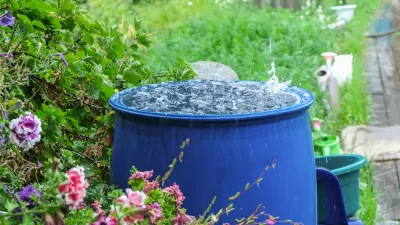Nate Berg looks at a new study analyzing the cost benefits of large-scale green infrastructure projects, which demonstrates that governments are wasting billions of dollars a year by not going green.
While large-scale green infrastructure projects such as roof gardens or permeable streets are often characterized as being hugely expensive, a new study, co-authored by the American Society of Landscape Architects, American Rivers, the Water Environment Federation, and ECONorthwest, set out to compare the costs of such projects with traditional infrastructure projects.
According to Berg, in "Looking at 479 case studies of green infrastructure projects around the U.S., the report finds that the majority of projects turned out to be just as affordable or even more so than traditional "grey" infrastructure. About a quarter of projects raised costs, 31 percent, kept costs the same and more than 44 percent actually brought costs down."
Paying particular attention to the benefits of green infrastructure projects to cities with combined sewer systems, the study found significant cost savings for early adopter communities. Furthermore, as Berg notes, "by allowing natural processes to take over the work we've been building infrastructure to handle, operations and maintenance costs also fall. The report concedes that some maintenance on green infrastructure will still be required, but that it is significantly less than what's required by traditional infrastructure."
FULL STORY: Green Infrastructure Could Save Cities Billions

Maui's Vacation Rental Debate Turns Ugly
Verbal attacks, misinformation campaigns and fistfights plague a high-stakes debate to convert thousands of vacation rentals into long-term housing.

Planetizen Federal Action Tracker
A weekly monitor of how Trump’s orders and actions are impacting planners and planning in America.

San Francisco Suspends Traffic Calming Amidst Record Deaths
Citing “a challenging fiscal landscape,” the city will cease the program on the heels of 42 traffic deaths, including 24 pedestrians.

Defunct Pittsburgh Power Plant to Become Residential Tower
A decommissioned steam heat plant will be redeveloped into almost 100 affordable housing units.

Trump Prompts Restructuring of Transportation Research Board in “Unprecedented Overreach”
The TRB has eliminated more than half of its committees including those focused on climate, equity, and cities.

Amtrak Rolls Out New Orleans to Alabama “Mardi Gras” Train
The new service will operate morning and evening departures between Mobile and New Orleans.
Urban Design for Planners 1: Software Tools
This six-course series explores essential urban design concepts using open source software and equips planners with the tools they need to participate fully in the urban design process.
Planning for Universal Design
Learn the tools for implementing Universal Design in planning regulations.
Heyer Gruel & Associates PA
JM Goldson LLC
Custer County Colorado
City of Camden Redevelopment Agency
City of Astoria
Transportation Research & Education Center (TREC) at Portland State University
Jefferson Parish Government
Camden Redevelopment Agency
City of Claremont




























